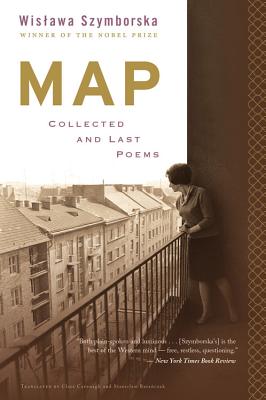APS TOGETHER
Map by Wisława Szymborska

Hosted by Ilya Kaminsky
Began on August 5, 2020
Share this book club
Welcome to the Republic of Szymborska. As we watch (and live through) all the mess and tragedy happening around us (and inside us), let’s console ourselves with a poet who knows what it means live in a moment of crisis. A poet who survives. A poet who laughs amidst misfortune. A poet who delights. How did she do it? How does she manage to smile as she looks in the face of history (i.e. tragedy)? What is the secret to her light touch? Her playfulness, wisdom? I invite you to spend ten days answering these questions together, as we explore Map: Collected and Last Poems of Wisława Szymborska.

Ilya Kaminsky
was born in the former Soviet Union city of Odessa and is now an American citizen. He is the author of the collections Dancing in Odessa and Deaf Republic (both Graywolf), which won the National Jewish Book Award for Poetry. He has received a Whiting Award, a Lannan Literary Fellowship, and a Guggenheim Fellowship.

Wisława Szymborska
(1923–2012) was a Polish poet whose work has been widely translated into English. Influenced by Poland's history from World War II through Stalinism, but also a deeply personal poet and chronicler of the everyday, Szymborska wrote more than fifteen books of poetry. She received the Nobel Prize in Literature in 1996.

Daily Reading
Day 1
Calling Out to Yeti. Pages 19-55
August 6, 2020 by Ilya Kaminsky
Let’s begin our conversation with “Classifieds,” the poem on page 32. Why so late into the book? As per the translator’s own afterword:
Day 2
Salt. Page 59-103.
August 7, 2020 by Ilya Kaminsky
I wonder if “Travel Elegy” is another letter to Yeti? Altho Szymborska takes us from Paris- Leningrad-Caucasus I read this not as a mere piece on tourism but a letter to beyond, a confession about our human condition, our tourism of being on this planet at all.
Day 3
No End of Fun. Pages 109-150.
August 8, 2020 by Ilya Kaminsky
Writing about Szymborska’s poems, Edward Hirsch asserts that her lines “take place on the edge of an abyss. It’s the poetry of the close shave. It’s not only accidents we contend with, but history itself, with its hatreds and more deaths than we can count. Against which: the imagination, the joy of writing.”
Day 4
Could Have. Pages 155-192.
August 9, 2020 by Ilya Kaminsky
I mentioned the use of perspective in Szymborska. What is it that we see? How much more can we see? In “The Letters of the Dead,” writing years after her Cassandra, Szymborska asserts:
Day 5
A Large Number. Pages 197-233.
August 10, 2020 by Ilya Kaminsky
A Large Number is the title of her mid-career book, and indeed, by the mid-70s, Szymborska goes full force investigating all kinds of large unanswerable questions. She opens the book with “A Large Number,” telling us straight:
Day 6
The People on the Bridge. Pages 237-276.
August 11, 2020 by Ilya Kaminsky
Ten years pass. In her next book, People on a Bridge, Szymborska continues to explore our collective strangeness.
Day 7
The End and the Beginning. Pages 281-316.
August 12, 2020 by Ilya Kaminsky
I love overhearing the echoes in Szymborska’s poems. See for instance, the ending of “Some People Like Poetry”:
Day 8
Moment. Pages 321-352.
August 13, 2020 by Ilya Kaminsky
How interesting to compare these lines from “The Three Oddest Words” to her other negations, to see how her perspectives develop. Say, compare it to “The Railroad Station” or to the ending of “Frozen Motion.”
Day 9
Colon & Here. Pages 355-393.
August 14, 2020 by Ilya Kaminsky
Szymborska’s “ABC” is one of those pieces where she takes an ages-old form—this time abecedarian—and breathes new life into it: there’s gossip, there’s tenderness, there’s grief, and, as ever, it is all happening at the same time, in just a few lines:
Day 10
Here & Enough (The End).
August 15, 2020 by Ilya Kaminsky
As a practicing poet, I keep coming back to look at Szymborska’s combination of inventive syntax and plainspoken language eg: her use of periods in “Lot’s Wife,” which I mentioned before. Easy to see it again in the little poem “Divorce.”